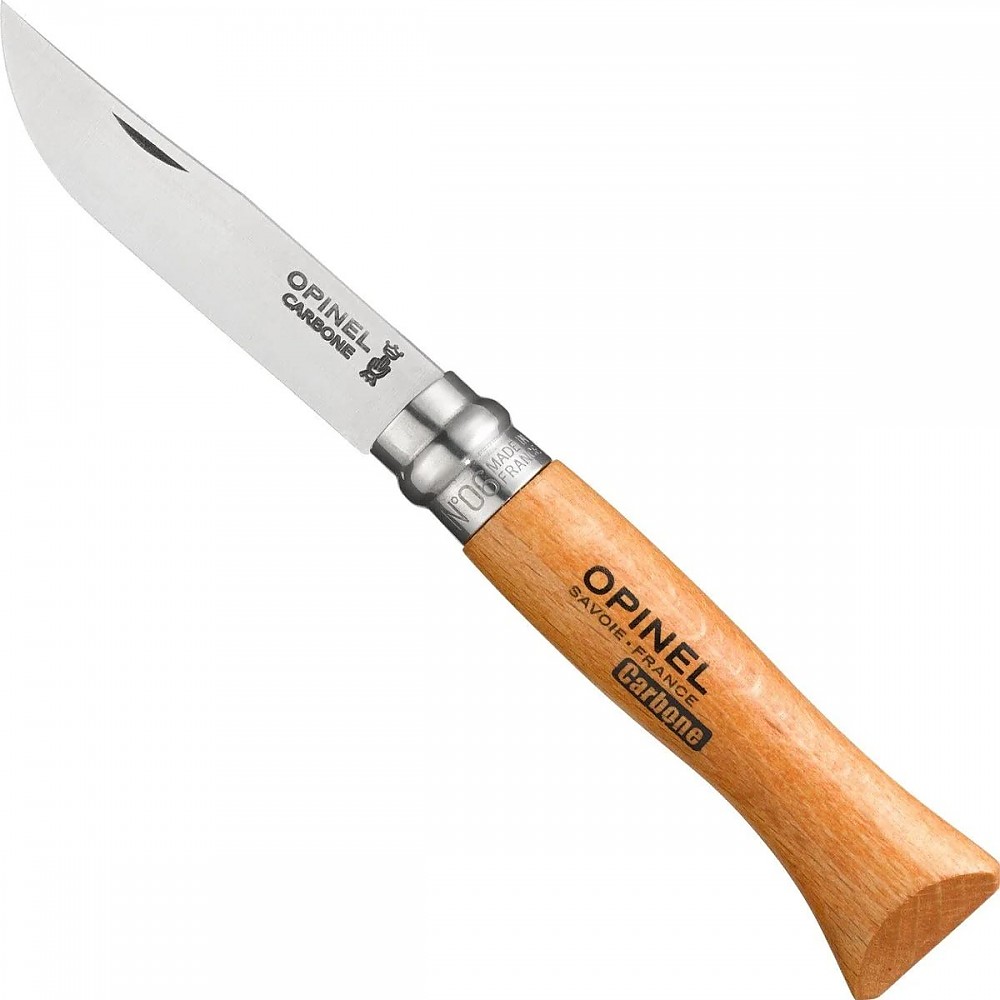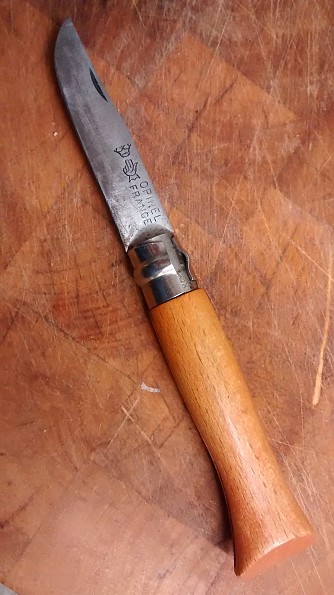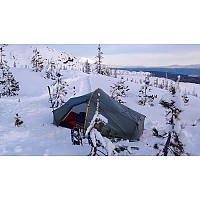Opinel No. 6 Folding Knife

Light, small, tough, and available. The blade you may find you need, at a price you definitely can afford.
Pros
- Excellent carbon steel
- Solid lock up
- Reliably tough.
- Tactile and ergonomic
- Feather light
- Dirt cheap
- Lifetime warranty (materials and manufacturing defects)
Cons
- Needs a lock ring: the UK legal versions are useless
- Carbon steel and wood, require basic maintenance
A simple design—one sharp, thin (1mm), pointy blade, which folds into a thinly finished beech handle. A chromed, spring steel lock ring, at the riveted pivot point, is a wonderful low-tech way to keep the knife open-or closed—until you change your mind. Available in many lengths; the seven centimetre blade works, for me. It weighs a negligible 27 grammes .
If your daily life involves building wilderness shelters, batoning firewood, or rope access, at industrial sites, you'll need a different product. For slicing your lunchtime apple, cutting cordage—or as I did last week, scraping the edge of your shower tray, prior to re-sealing it—an Opinel might be just what you need.
The French manufacturer also makes knives in stainless steel and with trickier handles but the basic knife has a blade of carbon steel. It takes a great edge and can be touched up on a rock, or the bottom of your ceramic coffee mug. The blade is a slightly elongated, clip point style. Tough enough for gouging but a little awkward, for serious carving. Great, for budding, grafting and other greenhouse, or garden tasks.
It will dress small game or fish, but a fixed blade will be easier to clean and sanitise, if you do this routinely. For slicing your bread or tomatoes, in camp or kitchen, an Opinel is almost as good as the paring knife, in your kitchen block. Just lighter and more versatile.

Over time, the finish wears off an Opinel and the carbon steel blade acquires a grey patina- especially when exposed to the acids in your orange peel. If you leave the knife submerged in water, the handle may swell slightly and the blade will rust. Embrace the patina. Consider customising your handle—but above all, keep your knife clean, sharp and dry it quickly, after doing so. Twenty years of daily work is nothing, for a loved and maintained example, of this European icon of cutlery. I rub a little olive oil on mine, after cleaning.
Thin, slicing blades, that can also spread butter on your toast, or peel bark from your latest garden project, come in all price brackets. At current prices, I could pay £10, for the Opinel of my choice, or perhaps ten times as much, for a competitor. Although I own fancier cutters, the Opinel is used extensively, admired for it's simplicity and functionality, preferred, for its cost-benefit ratio.
I bought a spare, before the recent price hikes started. You might want to do the same?
Background
I've owned at least one Opinel, for thirty years. My current number six, for about ten. I've never needed to test the warranty and I've never broken one of these knives.
Source: bought it new
Price Paid: £7
Everything you need in a folding pocketknife.
Pros
- Insanely sharp
- Foolprofe blade lock
- Comfortable wooden handle
- Range of sizes
- Low cost
Cons
- Sought after by airline security as lethal weapon.
- Confiscation and theft
- Carbon blade requires care from damp.
I have had a size 6 Opinel pocketknife for just about ever which lived in my backpack waist belt pocket until leaving Hobart, Tasmania, airport. An extremely zealous security lady took exception to its presence and confiscated it along with my wife's nailfile. On return to New Zealand I purchased a new one.
For backpacking, day walks, fishing, or biking this little knife does everything one could ask for; everything from gutting a fish to opening a ready meal, cutting line or string, cutting slices of cheese and much more. The carbon blade is insanely sharp from the get-go, you can shave with it, and is kept sharp on a small oil stone which I find is about every 6 months.
These knives are mass produced in Savoy, France, and have been a firm favourite with Europeans for many years. They come in a range of sizes from key ring to serious bush knife size and blade material is an amazing carbon steel and a stainless. I have always had the carbon, what the stainless steel blades are like I have no experience. The handle is made of European Beech wood and the blade is held in the open position with a revolving sleeve which locks it.
In all honesty this, is for me, the perfect small pocket knife, light in weight, comfortable to hold and use, and other than a little oil to stop rust needing little maintenance.
Background
Sixty plus years.
Source: bought it new
Price Paid: 20$ NZ
Lightweight with a well designed blade shape for camp kitchen preparing food.
Pros
- The French steel blade is top notch and keeps an edge for a long time.
Cons
- I am not a fan of the blade twist lock system, but for cooking this works alright.
My first Opinel knife I acquired I think was a number 7 from from REI in 1975. It had a pear wood handle and was a great tool. I lost it some 10 years later...
Last year my wife signed me up with Bespoke and in one of the boxes showed up a number 8. A good knife too for the same uses.
Background
Good knife (see above review.)
Source: received it as a personal gift
I was introduced to Opinel knives in 1991, and I have been using them ever since—on three continents. Great addition to the pack—alongside my Swiss Army knife of course.
Pros
- light
- easy to clean
Cons
- Only one blade... but you can find a version with a corkscrew, too!
Great addition to a well-equipped backpack.
Source: bought it new
Your Review
Where to Buy
You May Like
Specs
| Price |
MSRP: $16.00 Current Retail: $16.00-$35.00 Historic Range: $9.93-$90.00 |
| Weight |
1.2 oz |
| Blade Length |
2.87 in |
| Overall Length |
6.5 in |
| Steel |
12c27 Stainless or XC90 Carbon |



